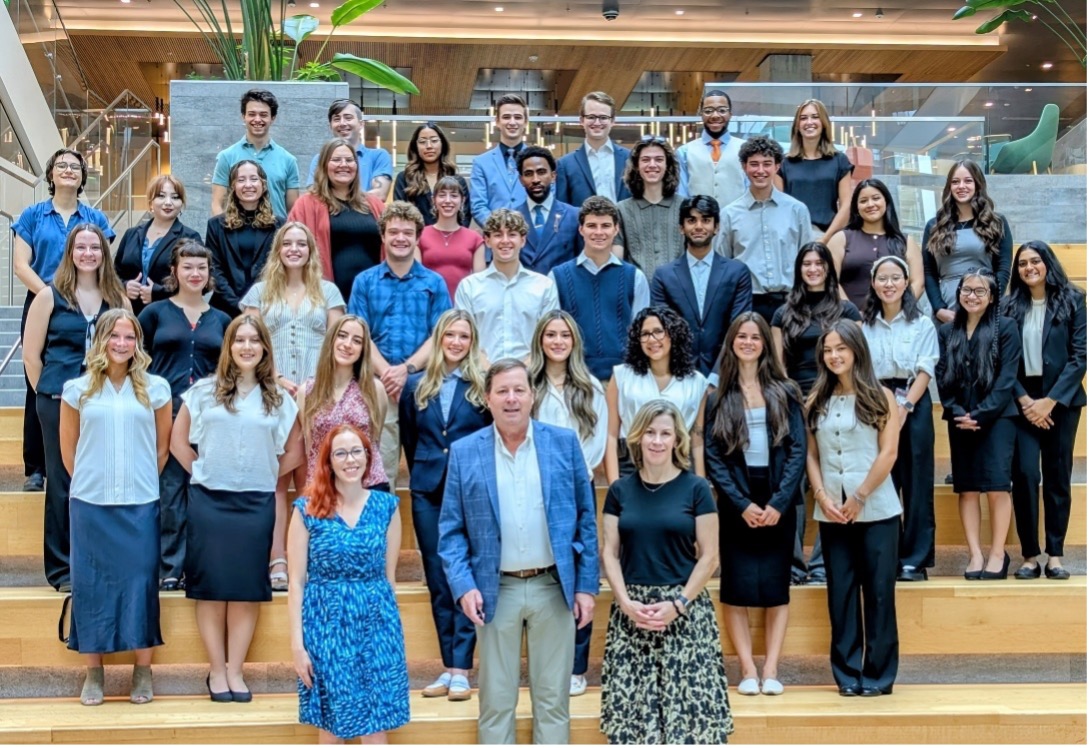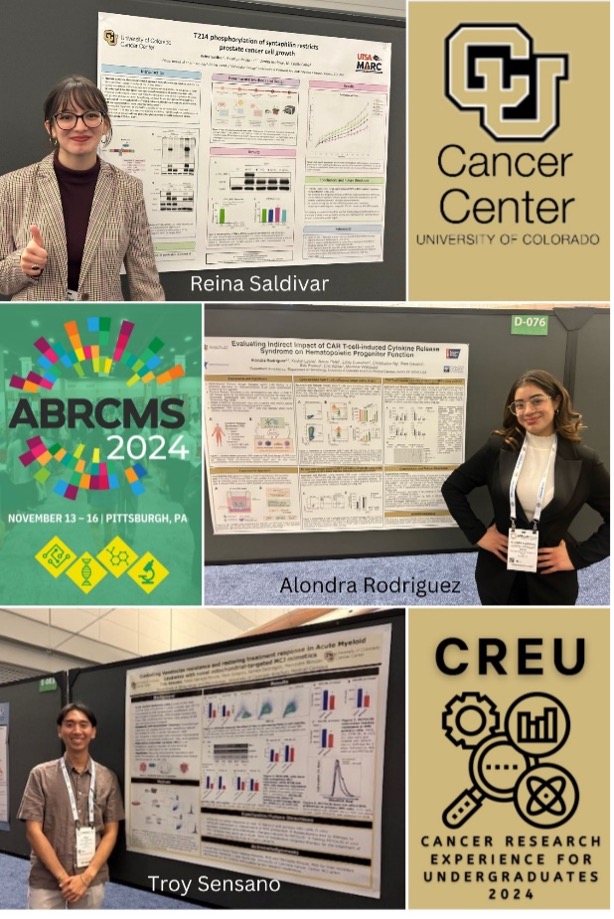.png?sfvrsn=1d53efb4_0)
Cancer Research Experience for Undergraduates (CREU)
Through the University of Colorado Anschutz Cancer Center's Cancer Research Experience for Undergraduates (CREU), every summer, selected college undergraduate fellows spend ten weeks in our laboratories at the University of Colorado Anschutz. An R25CA240122 grant and the University of Colorado Anschutz Cancer Center support the CREU program.
The goal of the program is to engage scientific curiosity in the next generation of scientists, challenging qualified college undergraduates to consider a cancer-related career in the future.
Additional participants in the American Cancer Society’s (ACS) Center for Innovation in Cancer Research Training (CICRT) Summer Undergraduate Research Fellowship (SURF) will form a cohort with fellows participating in CREU. For more information on the SURF Program, which will use the same application as CREU, click here.
Important Dates
Applications open on 11/15/25 to 02/01/2026.
Program dates are May 26 - July 31, 2026.
Meet Our Past Fellows

Summer Program Finale
CREU – Cancer Research Experience for Undergraduates and SURF – Summer Undergraduate Research Fellowship, scholars completed their 2025 season at the University of Colorado Anschutz with a Poster Session, that highlighted their projects, including research, findings, and results. Campus faculty and staff, as well as participants' family members, had the opportunity to listen to presentations and view posters. Congratulations to all CREU and SURF scholars; as well as to program PIs Rebecca Schweppe, PhD (CREU), and Traci Lyons, PhD (SURF), and Co-Director John Tentler, PhD, and Program Coordinator Claire McGraw, PhD. Well Done!


Esha Chopra, a 2024 CREU student, named a 2025 NSF Graduate Research Fellowship Program (GRFP) fellow.
CREU 2024 alumna, Esha Chopra, has been awarded a prestigious NSF GRFP fellowship to pursue her graduate studies in biomedical engineering at the Rensselaer Polytechnic Institute.
GRFP recognizes and supports outstanding students early in their careers who are pursuing research-based master’s and doctoral degrees in science, technology, engineering, and mathematics (STEM) or in STEM education at accredited U.S. institutions. The five-year fellowship provides three years of financial support, inclusive of an annual stipend.
Congratulations, Esha, on this tremendous achievement!
CREU Program Provides Pathways to Research Success for Undergraduates, with Insights from Khoa Nguyễn
The Cancer Research Experience for Undergraduates (CREU) program is a transformative initiative designed to provide students, especially those from first-generation college or socioeconomically disadvantaged backgrounds, with opportunities to gain hands-on experience in scientific research. By offering financial support, mentorship, and educational resources, the program allows students to focus entirely on their research pursuits without the burden of financial concerns.

Khoa Nguyễn, an MD/MBA candidate at the University of Colorado Anschutz, is one of the many students whose academic journey has been shaped by CREU. Nguyễn first joined the program before the COVID-19 pandemic and received additional funding in 2021 for in-person research activities. Reflecting on his experience, Nguyễn highlighted the importance of mentorship, which he believes was crucial for his growth. CREU not only provided him with professional skills, such as poster building and abstract submission, but also empowered him with opportunities to engage in research and present his findings, tools essential for furthering a career in science.
Nguyễn’s CREU research, under the mentorship of Michael Graner, PhD, primarily focused on neurosurgery, particularly brain tumors. His work centered on chordomas—rare tumors of the spine that can metastasize to the skull base. His research on exosomal interactions within chordoma cells, an area largely unexplored, aimed to understand how exosomes—small vesicles that carry genetic material and proteins—impact osteoblasts and the tumor microenvironment. This groundbreaking work has the potential to uncover new therapeutic pathways for rare tumor types. Looking forward, Nguyễn postulated, “I hope the findings from our research serve as a fundamental cornerstone to further motivate other researchers to continue exploring the signaling pathways of chordoma tumors and their exosomal effects, with the goal of advancing therapeutic options for this challenging pathology.”
Since his time with CREU, Nguyễn’s experience in medicine has inspired him to pursue a clinical career in plastic and reconstructive surgery. He is also involved in research focused on improving breast cancer reconstruction techniques, specifically salvage reconstruction methods post-mastectomy, to enhance patient outcomes using natural tissue. He notes, “CREU gave me the experience and skills to translate my research abilities towards any field of interest, so that I can continue to advance healthcare for my patients. I am beyond grateful to Dr. Graner and the program for shaping my path.”
In addition to his medical training, Nguyễn is pursuing an MBA through a dual-degree program to complement his clinical expertise with strategic decision-making skills in healthcare. He is passionate about advocating for underprivileged students and breaking down socioeconomic barriers in medical education, ensuring equitable access to research opportunities for all.
The CREU program continues to be a vital resource for undergraduates interested in cancer research. With its ongoing commitment to inclusivity, mentorship, and professional development, the program encourages students from diverse backgrounds to apply. As it fosters the next generation of researchers, CREU remains dedicated to providing meaningful research experiences that can lead to significant advancements in healthcare.
CREU 2024 Alumni Rank in Top 15% for Cancer Biology Presentations at Fall Conference
CREU 2024 alumni Troy Sensano (University of Hawai‘i at Mānoa), Reina Saldivar (University of Texas at San Antonio), and Alondra Rodriguez (University of Texas at El Paso) were recognized for their Outstanding Undergraduate Poster Presentations in Cancer Biology at the 2024 Annual Biomedical Research Conference for Minoritized Scientists (ABRCMS) in Pittsburgh, PA. Their presentations placed them in the top 15% of students presenting in the Cancer Biology category at the conference.
Congratulations to Troy, Reina, and Alondra, and best wishes to them and their 2024 cohort in all their future endeavors!

Elijah Johnson, a 2022 CREU Fellow, came to the CU Anschutz Cancer Center to research the mutation that makes him more likely to develop cancer.
Growing up in Windsor, Colorado, Elijah Johnson thought he would grow up to be a professional musician. He never considered a career as a biomedical researcher. But that all changed when his mother was diagnosed with Li-Fraumeni Syndrome (LFS), a rare genetic mutation that increases the risk of cancer.
→ Read Elijah's Story Here.
.jpg?sfvrsn=171c0ebb_2)
Accomplishments
Do you have an accomplishments you'd like to share? Let us know at the link below!
CREU/SURF/DICR Accomplishments Form